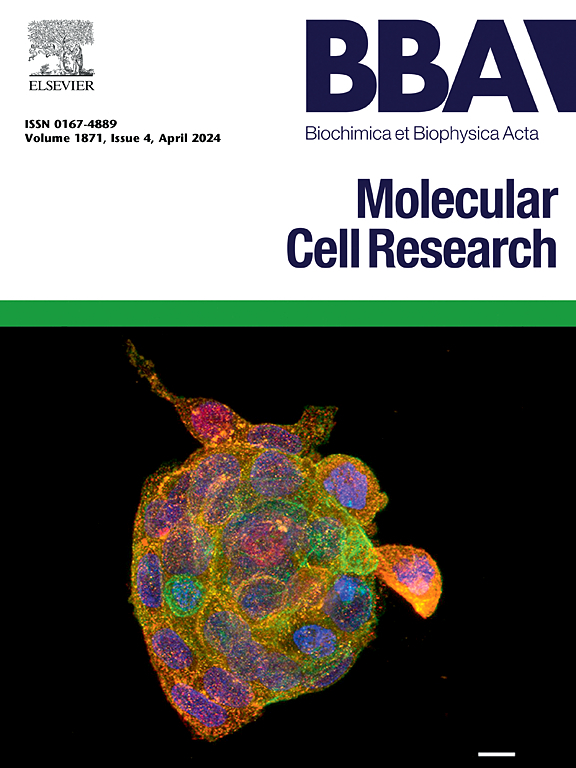Vasoactive intestinal peptide induces metabolic rewiring of human-derived cytotrophoblast cells to promote cell migration
IF 4.6
2区 生物学
Q1 BIOCHEMISTRY & MOLECULAR BIOLOGY
Biochimica et biophysica acta. Molecular cell research
Pub Date : 2025-02-01
DOI:10.1016/j.bbamcr.2024.119886
引用次数: 0
Abstract
The placenta has an extraordinary metabolic rate with high oxygen consumption. Extravillous cytotrophoblast cells (EVT) metabolism and function are critical to sustain their invasive phenotype supporting fetal development. Deficient EVT function underlies pregnancy complications as preeclampsia (PE) and fetal growth restriction (FGR). The vasoactive intestinal peptide (VIP) promotes human cytotrophoblast cell migration and invasion through mTOR signaling pathways suggesting its crucial role during placentation. Here we explored fatty acid uptake as well as lipid and glucose metabolism in human-derived cytotrophoblast cell function upon VIP stimulation. We found that VIP induced long chain fatty acid (LCFAs) uptake along with the expression of FATP2 transporter, CPT1 fatty acid oxidation (FAO)-rate limiting step importer, and lipid droplet accumulation. VIP induced the expression of glucose 6-P-dehydrogenase, a rate-limiting enzyme of the pentose phosphate pathway (PPP) and pyruvate dehydrogenase complex enzyme DLAT E2, without altering lactate secretion. This metabolic rewiring of trophoblast cells induced by VIP takes place without compromising mitochondrial function or reactive oxygen species (ROS) production. Moreover, cytotrophoblast cell migration induced by VIP required the three glycolysis, oxidative phosphorylation (OXPHOS) and FAO pathways. Our results provide evidence supporting VIP as a metabolic regulatory peptide in cytotrophoblast cells sustaining proper placentation and fetal growth.
血管活性肠肽诱导人源性细胞滋养层细胞代谢重组,促进细胞迁移。
胎盘的代谢率非常高,耗氧量也很高。体外细胞滋养层细胞(EVT)的代谢和功能是维持其侵袭性表型支持胎儿发育的关键。EVT功能缺陷是妊娠并发症如先兆子痫(PE)和胎儿生长受限(FGR)的基础。血管活性肠肽(VIP)通过mTOR信号通路促进人细胞滋养层细胞迁移和侵袭,提示其在胎盘形成过程中起重要作用。本研究探讨了VIP刺激对人源性细胞滋养层细胞功能的脂肪酸摄取、脂质和糖代谢的影响。我们发现VIP诱导长链脂肪酸(LCFAs)摄取,同时表达FATP2转运蛋白、CPT1脂肪酸氧化(FAO)速率限制步骤入口蛋白和脂滴积累。VIP诱导葡萄糖6- p -脱氢酶(戊糖磷酸途径的限速酶)和丙酮酸脱氢酶复合物DLAT E2的表达,但不改变乳酸分泌。这种由VIP诱导的滋养细胞的代谢重新布线在不影响线粒体功能或活性氧(ROS)产生的情况下发生。此外,VIP诱导的细胞滋养层细胞迁移需要糖酵解、氧化磷酸化(OXPHOS)和FAO三种途径。我们的研究结果提供了支持VIP作为细胞滋养层细胞维持正常胎盘和胎儿生长的代谢调节肽的证据。
本文章由计算机程序翻译,如有差异,请以英文原文为准。
求助全文
约1分钟内获得全文
求助全文
来源期刊
CiteScore
10.00
自引率
2.00%
发文量
151
审稿时长
44 days
期刊介绍:
BBA Molecular Cell Research focuses on understanding the mechanisms of cellular processes at the molecular level. These include aspects of cellular signaling, signal transduction, cell cycle, apoptosis, intracellular trafficking, secretory and endocytic pathways, biogenesis of cell organelles, cytoskeletal structures, cellular interactions, cell/tissue differentiation and cellular enzymology. Also included are studies at the interface between Cell Biology and Biophysics which apply for example novel imaging methods for characterizing cellular processes.

 求助内容:
求助内容: 应助结果提醒方式:
应助结果提醒方式:


